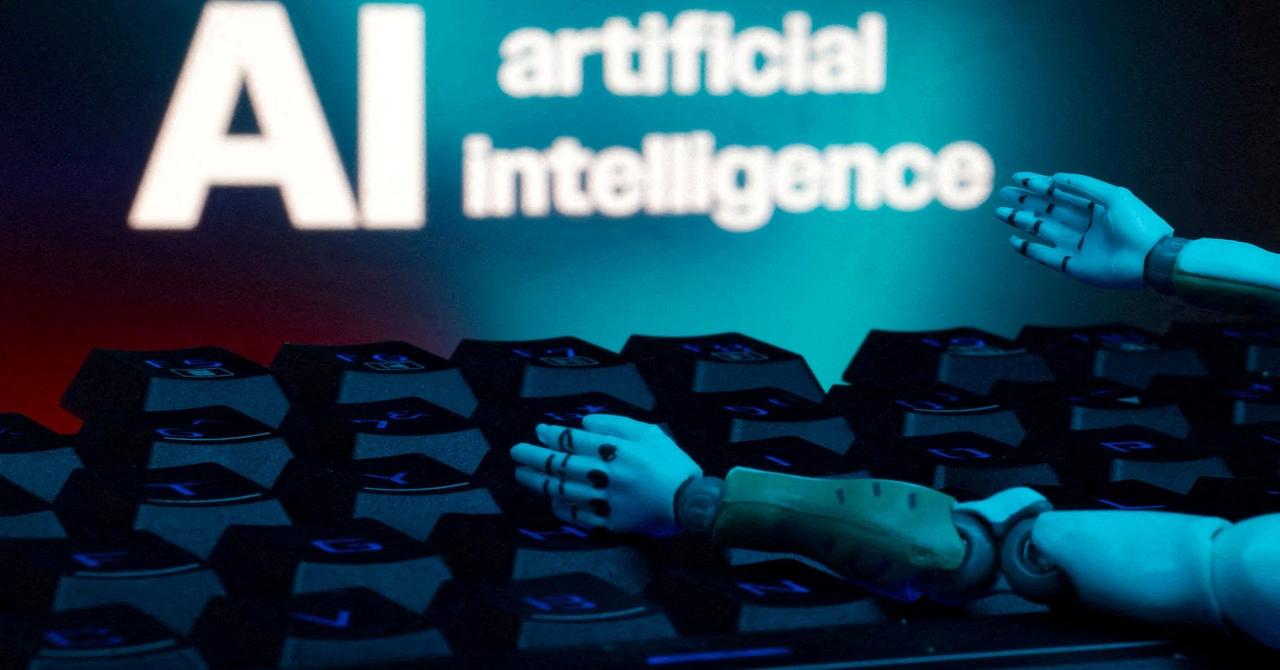Big Tech's AI Investments Raise Concerns Over Profit Margins and Depreciation Costs
2 Sources
2 Sources
[1]
AI Bets That Fueled Big Tech's Surge Now Threaten Rich Profits
Some investors are questioning the amount of cash Big Tech is throwing at artificial intelligence, fueling concerns for profit margins and the risk that depreciation expenses will drag stocks down before companies can see investments pay off. "On a cash flow basis they've all stagnated because they're all collectively making massive bets on the future with all their capital," said Jim Morrow, founder and chief executive officer at Callodine Capital Management. "We focus a lot on balance sheets and cash flows, and so for us they have lost their historical attractive cash flow dynamics. They're just not there anymore."
[2]
AI bets that fueled Big Tech's surge now threaten rich profits
Some investors are questioning the amount of cash Big Tech is throwing at artificial intelligence, fueling concerns for profit margins and the risk that depreciation expenses will drag stocks down before companies can see investments pay off. "On a cash flow basis they've all stagnated because they're all collectively making massive bets on the future with all their capital," said Jim Morrow, founder and chief executive officer at Callodine Capital Management. "We focus a lot on balance sheets and cash flows, and so for us they have lost their historical attractive cash flow dynamics. They're just not there anymore." Alphabet Inc., Amazon.com Inc., Meta Platforms Inc. and Microsoft Corp. are projected to spend $311 billion on capital expenses in their current fiscal years and $337 billion in 2026, according to data compiled by Bloomberg. That includes a more than 60% increase during the first quarter from the same period a year ago. Free cash flow, meanwhile, tumbled 23% in the same period. "There is a tsunami of depreciation coming," said Morrow, who is steering clear of the stocks because he sees profits deteriorating without a corresponding jump in revenue. Much of the money is going toward things like semiconductors, servers and networking equipment that are critical for artificial intelligence computing. However, this gear loses its value much faster than other depreciating assets like real estate. Microsoft, Alphabet and Meta posted combined depreciation expenses of $15.6 billion in the first quarter, up from $11.4 billion a year ago. Add in Amazon, which has pumped more of its cash into capital spending in lieu of buybacks or dividends, and the number nearly doubles. "People thought AI would be a monetization machine early on, but that hasn't been the case," said Rob Almeida, global investment strategist at MFS Investment Management. "There's not as fast of AI uptake as people thought." AI Bounce Of course, investors still have a hearty appetite for the technology giants given their dominant market positions, strong balance sheets and profit growth that, while slowing, is still beating the rest of the S&P 500. This explains the strong performance of AI stocks recently. Since April 9, the day President Donald Trump paused his global tariffs and turned a stock market swoon into a boom, the biggest AI exchange-traded fund, the Global X Artificial Intelligence & Technology ETF, is up 34%, while AI chipmaker Nvidia Corp. has soared 49%. Meta has gained 38%, and Microsoft has climbed 33% -- all topping the S&P 500's 21% jump and the tech-heavy Nasdaq 100 Index's 28% bounce. Just Tuesday, Bloomberg News reported that Meta leader Mark Zuckerberg is recruiting a secretive AI brain trust of researchers and engineers to help the company achieve "artificial general intelligence," meaning creating a machine that can perform as well as humans at many tasks. It's a monumental undertaking that will require a vast investment of capital. And in response Meta shares reversed Monday's decline and rose 1.2%. But with more and more depreciating assets being loaded on the balance sheet, the drag on the bottom line will put increased pressure on the companies to show bigger returns on the investments. Dealing With Depreciation This is why depreciation was a frequent theme in first-quarter earnings calls. Alphabet Chief Financial Officer Anat Ashkenazi warned that the expenses would rise throughout the year, and said management is trying to offset the noncash costs by streamlining its businesses. "We're focusing on continuing to moderate the pace of compensation growth, looking at our real estate footprint, and again, the build-out and utilization of our technical infrastructure across the business," she said on Alphabet's April 24 earnings call. Other companies are taking similar steps. Earlier this year, Meta Platforms extended the useful life period of certain servers and networking assets to five and a half years, from the four-to-five years it previously used. The change resulted in a roughly $695 million increase in net income, or 27 cents a share, in the first quarter, Meta said in a filing. Microsoft did the same in 2022, increasing the useful lives of server and networking equipment to six years from four. When executives were asked on the company's April 30 earnings call about whether increased efficiency might result in another extension, Chief Financial Officer Amy Hood said such changes hinge more on software than hardware. "We like to have a long history before we make any of those changes," she said. "We're focused on getting every bit of useful life we can, of course, out of assets." Amazon, however, has taken the opposite approach. In February, the e-commerce and cloud computing company said the life span of similar equipment is growing shorter rather than longer and reduced useful life to five years from six. To Callodine's Morrow, the big risk is what happens if AI investments don't lead to a dramatic growth in revenue and profitability. That kind of market shock occurred in 2022, when a contraction in profits and rising interest rates sent technology stocks plummeting and dragged the S&P 500 lower. "If it works out it will be fine," said Morrow. "If it doesn't work out there's a big earnings headwind coming." -- With assistance from Tom Contiliano, Ryan Vlastelica and Subrat Patnaik.
Share
Share
Copy Link
Investors question the massive AI investments by tech giants, worried about stagnating cash flows and increasing depreciation expenses that could impact stock performance before investments yield returns.
Big Tech's AI Investment Spree Raises Concerns
In a bold move that's reshaping the tech landscape, major players like Alphabet, Amazon, Meta, and Microsoft are pouring unprecedented amounts into artificial intelligence (AI) investments. However, this aggressive strategy is now raising eyebrows among investors, who are questioning the impact on profit margins and cash flows
1
2
.The Scale of AI Investments
The magnitude of these investments is staggering. According to data compiled by Bloomberg, these tech giants are projected to spend a whopping $311 billion on capital expenses in their current fiscal years, with this figure expected to rise to $337 billion in 2026
2
. This represents a more than 60% increase in the first quarter compared to the same period last year.Impact on Cash Flow and Depreciation
While these investments are aimed at securing a dominant position in the AI race, they're having a significant impact on companies' financials. Free cash flow tumbled 23% in the first quarter, raising concerns about the sustainability of these massive expenditures
2
.Jim Morrow, founder and CEO of Callodine Capital Management, points out:
"On a cash flow basis they've all stagnated because they're all collectively making massive bets on the future with all their capital. We focus a lot on balance sheets and cash flows, and so for us they have lost their historical attractive cash flow dynamics."
1
The Depreciation Dilemma
A key concern is the rapid depreciation of AI-related assets. Much of the investment is going towards semiconductors, servers, and networking equipment critical for AI computing. However, these assets lose value much faster than traditional depreciating assets like real estate
2
.
Source: Bloomberg
The impact is already visible. Microsoft, Alphabet, and Meta posted combined depreciation expenses of $15.6 billion in the first quarter, up from $11.4 billion a year ago. When Amazon is included, this figure nearly doubles
2
.Strategies to Manage Depreciation
Companies are adopting various strategies to manage this depreciation challenge:
-
Extending Asset Lifespans: Meta Platforms extended the useful life period of certain servers and networking assets to five and a half years, resulting in a $695 million increase in net income for Q1
2
. -
Operational Streamlining: Alphabet's CFO, Anat Ashkenazi, mentioned efforts to moderate compensation growth and optimize real estate and technical infrastructure
2
. -
Software Focus: Microsoft's CFO, Amy Hood, emphasized that changes in useful life assessments hinge more on software improvements than hardware
2
.
Related Stories
Investor Sentiment and Market Performance
Despite these concerns, investor appetite for tech giants remains strong. Since April 9, the Global X Artificial Intelligence & Technology ETF has surged 34%, while AI chipmaker Nvidia has soared 49%. Meta and Microsoft have also seen significant gains, outperforming both the S&P 500 and the Nasdaq 100 Index
2
.The Road Ahead
The key question now is whether these massive AI investments will translate into dramatic growth in revenue and profitability. Rob Almeida, global investment strategist at MFS Investment Management, notes:
"People thought AI would be a monetization machine early on, but that hasn't been the case. There's not as fast of AI uptake as people thought."
2
As the tech giants continue their AI arms race, the market watches closely. The success of these investments could redefine the tech landscape, but failure could lead to significant earnings headwinds, reminiscent of the market shock in 2022 when technology stocks plummeted amid contracting profits and rising interest rates
2
.References
Summarized by
Navi
[2]
Related Stories
Wall Street Skeptical of Big Tech's AI Profit Potential Despite Massive Investments
02 Aug 2024

AI Fears Trigger Historic Stock Market Sell-Offs as New Tools Spark Disruption Concerns
12 Feb 2026•Business and Economy

Tech Giants Double Down on AI Investments Despite Efficiency Concerns
07 Feb 2025•Business and Economy

Recent Highlights
1
Pentagon threatens to cut Anthropic's $200M contract over AI safety restrictions in military ops
Policy and Regulation

2
ByteDance's Seedance 2.0 AI video generator triggers copyright infringement battle with Hollywood
Policy and Regulation

3
OpenAI closes in on $100 billion funding round with $850 billion valuation as spending plans shift
Business and Economy





